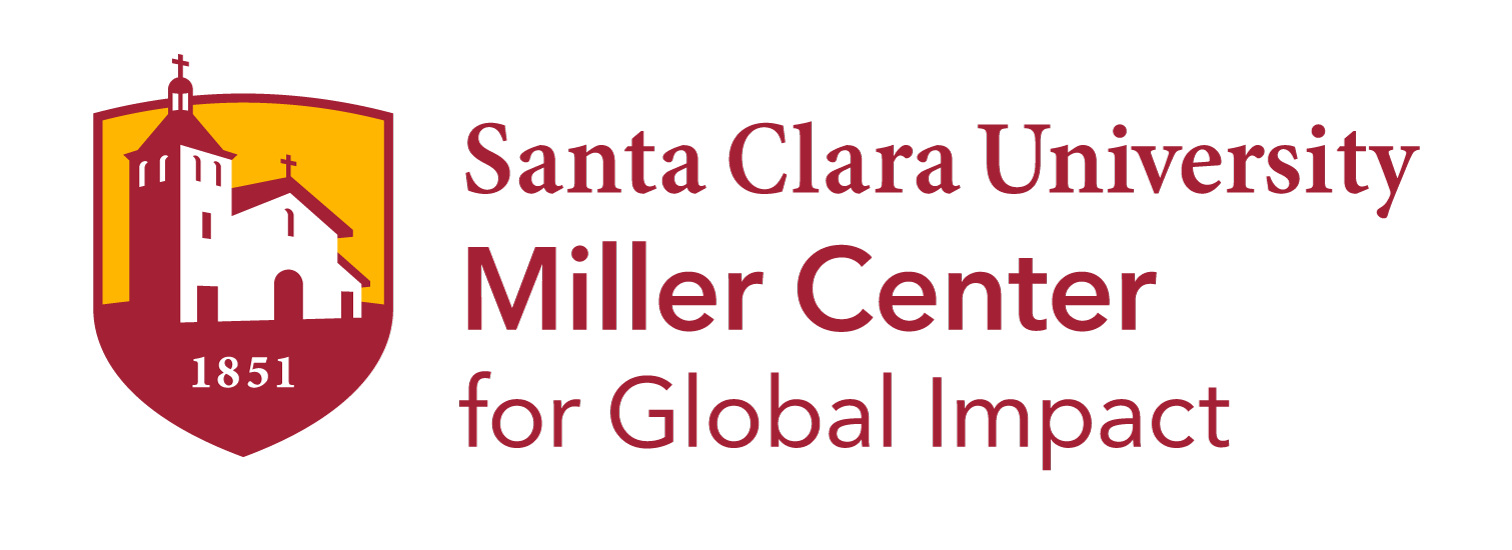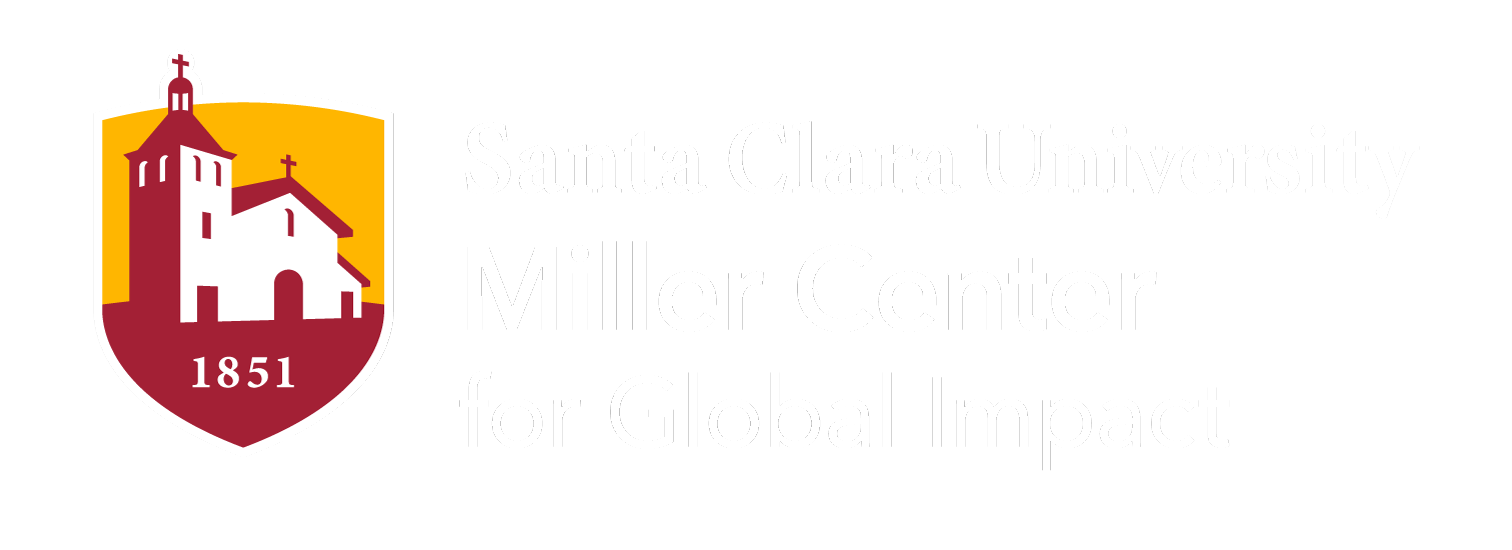By Linda Gentry, Senior Manager of Campus Engagement & Karen Carter, Director of Marketing Communications
At Santa Clara University, we recently brought together voices from across campus for a timely and much-needed conversation: What happens when the U.S. pulls back on foreign aid, and what does that mean for justice, dignity, and global solidarity?
Speakers from Santa Clara’s Division of Mission and Ministry, the Markkula Center for Applied Ethics, the Jesuit School of Theology, and Miller Center for Global Impact offered insights drawn from their work and lived experience. What emerged was a layered and very human exchange that connected politics and policy to the real lives impacted around the world.
Reckoning with the Legacy of American Aid: Context from Matthew Carnes, S.J.

Matthew Carnes, S.J., Vice President for Mission and Ministry and a political scientist, opened with a look at the big picture. Drawing from years of working on development projects in Latin America, he unpacked the complicated history of U.S. foreign aid. On one hand, he said, U.S. funding has helped lift millions out of poverty, expanded access to education and healthcare, and played a central role in post-World War II development. On the other hand, it’s also been used to serve American interests and has sometimes perpetuated inequality.
Father Carnes warned that recent cuts to NGOs and development programs are undoing hard-won gains, leaving people without jobs, children out of school, and entire health systems gutted. He emphasized that foreign aid can do a lot of good, but it can also cause harm. If we want to engage honestly, we have to sit with that tension.
Centering Human Dignity: Insights from William O’Neill, S.J.
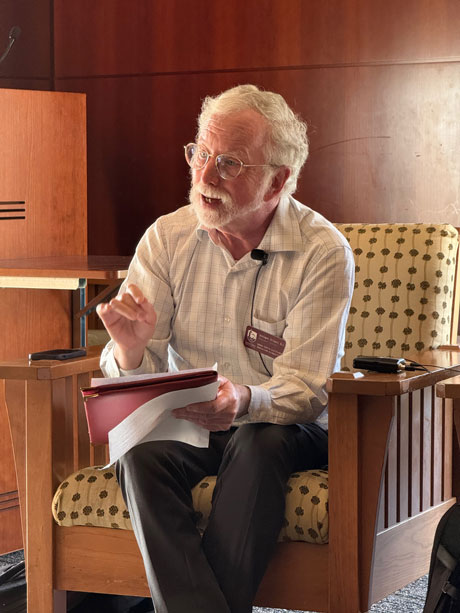
William O’Neill, S.J., Director of Immigration Ethics at the Markkula Center, brought the conversation to the global refugee crisis. He’s seen it firsthand after spending more than five years working with displaced communities in East Africa. By mid-2024, over 122 million people had been forcibly displaced—the highest number ever recorded. Cuts to aid mean millions are now left without food, shelter, or medical care.
O’Neill spoke bluntly about the moral cost of these decisions. He critiqued the rise of ethnonationalist populism in the U.S. and beyond, which frames human rights as conditional—something to be “earned,” rather than something everyone deserves. That mindset threatens the very idea of shared humanity.
Instead, he called for a renewed commitment to the values of the Universal Declaration of Human Rights, Catholic Social Teaching, and other faith traditions. He challenged us to build systems that actively promote justice, dignity, and the flourishing of all people.
Challenging the ‘Family First’ Narrative: Reflections from Julie Rubio
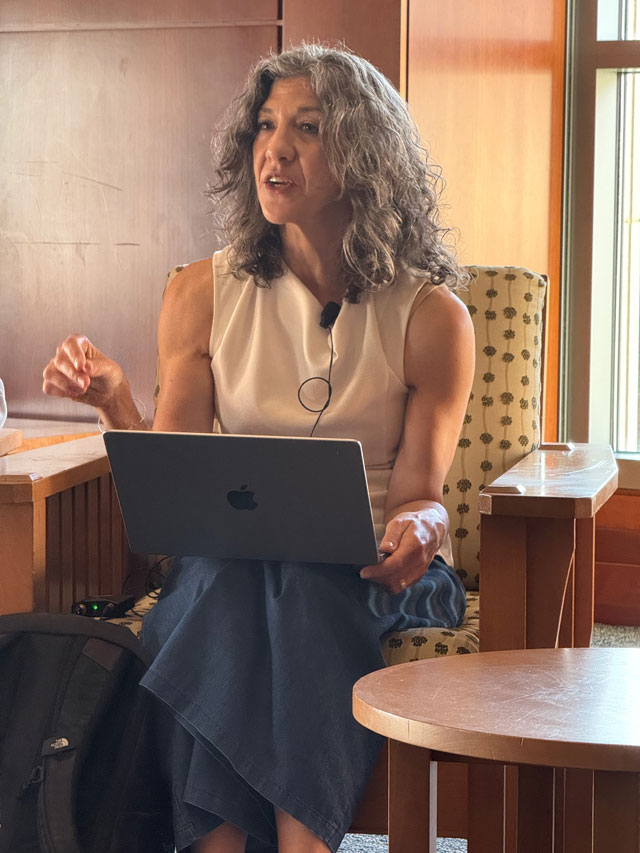
Julie Rubio, Associate Dean at the Jesuit School of Theology, focused on how U.S. foreign aid decisions can be devastating to people already living on the margins. She challenged the “family first” mindset that’s often used to justify budget cuts, showing how that thinking leaves millions behind. Catholic Relief Services, for example, has been forced to shut down programs that once provided food, healthcare, and education to more than 20 million people in some of the world’s most vulnerable communities.
Part of the problem is public perception. Around 58% of U.S. adults believe we spend too much on foreign aid, estimating it makes up about 25% of the federal budget. In reality, it’s closer to 1%.
She quoted Pope Francis, who wrote, “Jesus asks us not to decide who is close enough to be our neighbor, but rather that we ourselves become neighbors to all” (Fratelli Tutti, 2020). In the face of global poverty, climate change, and displacement, Rubio agreed that our responsibility crosses borders. It begins with humility, accountability, and dignity for all.
Advancing Community-Based Solutions: Perspectives from Karen Runde
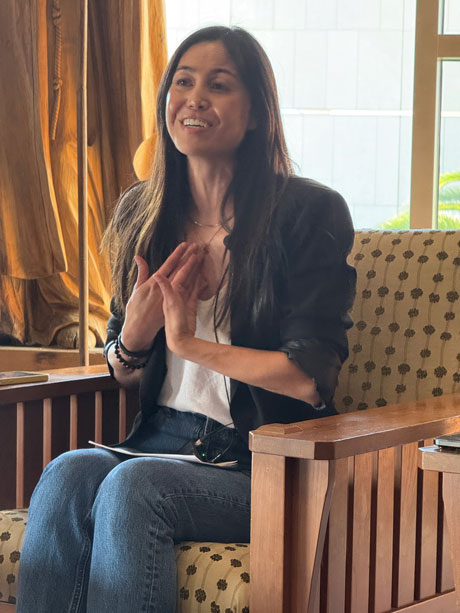
Karen Runde, Senior Director at Miller Center for Global Impact, talked about the real-world impacts on communities that are most affected. For instance, on a recent trip to Nairobi, she learned that 70% of public nurses in Kenya are paid through USAID. With that support slashed, clinics are closing, nurses are going unpaid, and people are losing access to lifesaving care. To put it clearly, “People will suffer. People will die.”
It’s a reminder of how foreign aid, when structured top-down, can create deep dependence, and how unsustainable that model can be. Runde pointed to a more hopeful path. Through her work with Miller Center, she’s seen social enterprises build solutions rooted in local leadership, innovation, and resilience. These entrepreneurs are building businesses that meet urgent needs, like food security and access to energy, without waiting for outside resources. Real change, she said, doesn’t come from control or charity. It comes from listening, building partnerships, and investing in people’s ability to shape their own future.
What We Can Learn and Do
This conversation didn’t just highlight the problems—it asked us to look inward. How do our choices, whether as individuals, institutions, or nations, reflect the values we say we believe in? Are we building systems grounded in dignity and justice—or just protecting our own interests?
Foreign aid is messy, political, and imperfect. But it also has the potential to help shape a more compassionate, connected, and just world. In a time of growing division and inequality, we have an opportunity to come together around our shared humanity and choose to lead with care.
